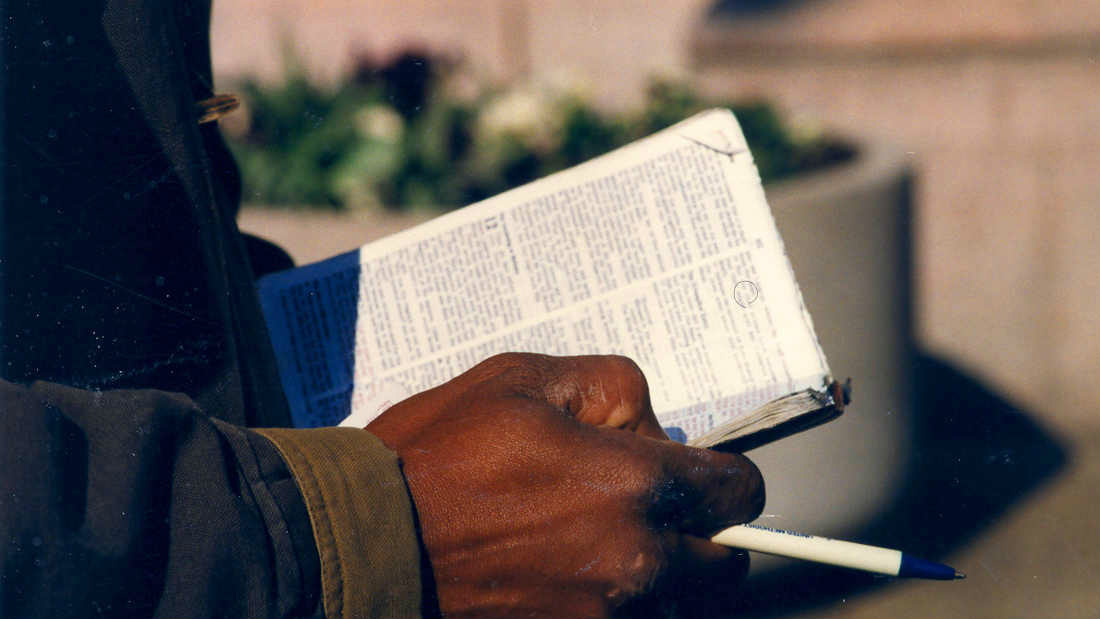Under Pope Francis’ leadership, the Catholic Church is looking more, well, Protestant.
That’s especially true when it comes to prayer and the Bible.
“It is not for putting on a shelf, but rather to have it at hand,” Francis said of the Bible last year. “It is for reading it often, every day, either individually or in groups, husband and wife, parents and children; maybe at night, especially on Sundays. That way, the family can move forward with the light and the power of the Word of God!”
The Vatican has worked to increase scripture distribution under Francis, the American Bible Society (ABS) said. In the last year, according to ABS, the Vatican distributed thousands of copies of the book of Mark in St. Peter’s Square. Last week, half a million copies of the book of Luke were handed out during the World Meeting of Families in Philadelphia. And the United States Conference of Catholic Bishops has designated November 15–21 as National Bible Week.
Catholics seem to be responding: ABS research found 67 percent of Catholic Bible readers wanted to read the Bible more often, a 50 percent increase from the previous year. A third of Catholics (33%) actually did read the Bible more than the previous year. The ABS also found:
- Almost all (96%) of practicing Catholics (those who attend a religious service at least once a month and who say their faith is very important in their lives) have a Bible at home. One out of five read their Bibles several times a week; 14 percent read every day. These readers average about 37 minutes of Bible reading in each sitting.
- About seven in ten (69%) practicing Catholics say they read the Bible because it brings them closer to God; 20 percent because they have a problem they need to solve or direction they need to find; and 7 percent for comfort.
- Just under half (46%) of practicing Catholics feel peaceful when they read the Bible; one in three feel encouraged, feel hopeful, and/or gain a sense of direction. About two out of three (64%) said they gave a lot of thought to how the Bible might apply to their lives.
- About 70 percent say the Bible is “inspired,” while about 60 percent say the Bible contains everything a person needs to know to live a meaningful life.
- About half of practicing Catholics say the Bible’s main message is that God is love. More than a quarter (28%) said the Bible explains who God is and his desire to have a relationship with the people he created.
- Around 70 percent of practicing Catholics think the Bible has too little influence on society, and that politics would be more civil and more effective if politicians read the Bible regularly.
The pope has also called on Catholics to add a personal touch to their prayers.
“The Lord tells us: 'the first task in life is this: prayer,'” Francis said two years ago. “But not the prayer of words, like a parrot; but the prayer, the heart: gazing on the Lord, hearing the Lord, asking the Lord.”
“I tell Jesus what comes to my mind to tell him,” he added.
And indeed, the way Catholics pray is also looking a little more personal.
According to Pew Research Center:
- Twice as many Catholics said their prayers are personal conversations with God (44%) rather than memorized prayers (21%).
- More than two-thirds of Catholics say having a personal relationship with Jesus and believing in his resurrection are essential to being Catholic. In contrast, just over half said devotion to Mary and receiving the sacraments are essential.
- Young (25- to 45-year-old) Catholic parents are also big on individual prayer, found a survey by Holy Cross Family Ministries.
- Three-quarters of young Catholic parents prefer to pray individually, while 7 percent pray with their family.
- Nearly 60 percent pray at least once a week, and more than 80 percent said they pray for their family “most of the time” or “always.”
- More than seven in ten said that prayer is essential to their faith.
The pontiff has encouraged Catholics to seek God for themselves, historically a Protestant view.
“The human heart searches always for prayer, even without knowing it; and if it doesn’t find it, doesn’t have peace,” said the pontiff at the Vatican in August. “For this encounter you need to cultivate in your heart a ‘hot’ love for God, an affective love.”
Two in ten (22%) Catholics who have heard of Francis said he’s caused them to make changes to their spiritual life, reported Barna in September. That’s up 10 percentage points from last year.
It’s just slightly lower than the number of Protestants (23%) familiar with Francis who said he influenced their spiritual life, a number that has leaped 19 percentage points from 2014.
Overall, Francis remains as popular as ever, Pew Research Center found. His approval rating is 68 percent, up four percentage points since June and down two from February.
That bump is coming primarily from non-Catholics: two-thirds (65%) of them now approve of Francis, up from 58 percent in June, Pew said. That includes a 60 percent approval rating among white evangelicals.
Protestant pastors also are impressed with Francis. Sixty percent say he’s a brother in Christ, according to Nashville-based LifeWay Research.
CT keeps an eye on Pope Francis, noting his enormous popularity, his papal encyclical on the environment and how many of his fans disagree, and his apology to the “first evangelicals.”
[Image courtesy of Elvert Barnes – Flickr]








